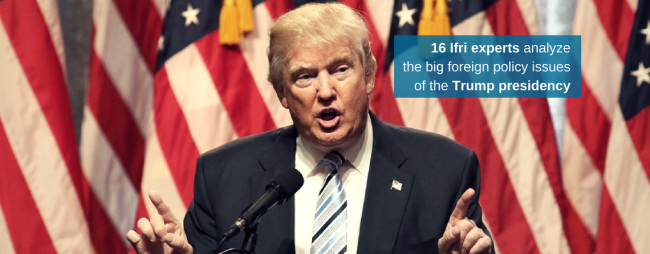Turkey
Analysis of Turkey's internal and external dynamics as a regional power, with a focus on diplomatic, economic and political issues linked to Recep Tayyip Erdoğan's third term in office.
Related Subjects

Trade without Religion between Turkey and Syria
A saying claims that trade has no religion; it even adapts to a war situation, as demonstrated by the real-time reorganisation of trade channels at the Turkish-Syrian border.
Le monde selon Trump. Anticiper la nouvelle politique étrangère américaine
What will become of US foreign policy under Donald Trump? A selection of Ifri researchers has come together to offer their thoughts on this question. Our experts cover an array of topics through 14 contributions, ranging from the future Sino-American relations, through US engagement in the Middle East, to the prospects of a renewed transatlantic relationship. This analysis intends to help readers anticipate the outcomes of this election in order to facilitate decision-making.
War and Democratic Decision Making: How do Democracies Argue and Decide Whether or Not to Intervene in Distant Wars?
What is the proper place and forum for decisions about war and peace in a democracy? There is surprisingly little consensus on this matter, not in theory and not in practice. While in Iraq, Libya and Syria, all Western actions have ended in failure, it seems necessary to analyze the place and importance of this aspect of the democratic decision making.
The Taboo of the Armenian Genocide, Part Two: The Politics of American Avoidance
The Armenian Genocide has been a topic of trials and tribulations in American politics for quite some time. It has been an issue in Presidential campaigns, like that of now-President Obama: when he promised to recognize it. It has been the topic of votes, such as the most recent 2010 vote which failed to recognize the genocide. It has been a funnel for interests, lobbying, and foreign investment. With Germany recently recognizing the genocide and an American Presidential election at hand, speculation of American recognition is once again at a high. As politicians debate the issue, or avoid it altogether, the American political system moves forward. There are various key players in American politics, but in specificity to the Armenian Genocide issue, there are the Armenian, Turkish, and Israeli lobbies, and the constituencies they represent.
The Taboo of the Armenian Genocide, Part One: Global Reaction and American Inaction
In the Syrian refugee crisis enveloping Europe, Turkey has become the bottleneck toward which migrants are flowing into Europe, a factor increasingly important for Germany in particular. Relations have been strained, however, due to disputes over the possibility of lifting visa requirements.

Kurds against IS: An Effective Military Solution?
The Kurdish military’s recent history immediately brings to mind images of its mythical female fighters, and of its real victories against Daesh. But its successes have been primarily in Syria. In Iraq, the Kurdish military has been hindered by poor preparation, lack of effective weaponry, and various political and tactical disagreements between actors. Without support from the West, Kurdish forces will not be able to win the on-ground offensive.

Revisiting Relations 100 Years After the Armenian Genocide
The 100th anniversary of the Armenian genocide will not mark a great historical moment in Armenian-Turkish relations.

Turkey and the Armenian Genocide: from Denial to Recognition?
At the close of World War I, denial of the Armenian genocide became a central point in Turkey’s official doctrine.
Russia’s New Energy Alliances: Mythology versus Reality
This brief paper analyzes the energy relations between Russia and its “new” energy partnerships – with China and Turkey – that the Kremlin tends to publicly promote as an alternative to energy relations with the West.
The Kurds: a Channel of Russian Influence in the Middle East?
With the Syrian crisis entering its fifth year, the changing security context in Syria and Iraq since the summer of 2014 has highlighted the increasingly important role played by the Kurds as a fighting force against Islamic State (IS). In a more general context of renewed Russian influence in the Middle East since the late 2000s, the development of Russo-Kurdish relations has entered a new phase since the beginning of the current decade.
Support independent French research
Ifri, a foundation recognized as being of public utility, relies largely on private donors – companies and individuals – to guarantee its sustainability and intellectual independence. Through their funding, donors help maintain the Institute's position among the world's leading think tanks. By benefiting from an internationally recognized network and expertise, donors refine their understanding of geopolitical risk and its consequences on global politics and the economy. In 2025, Ifri supports more than 80 French and foreign companies and organizations.











